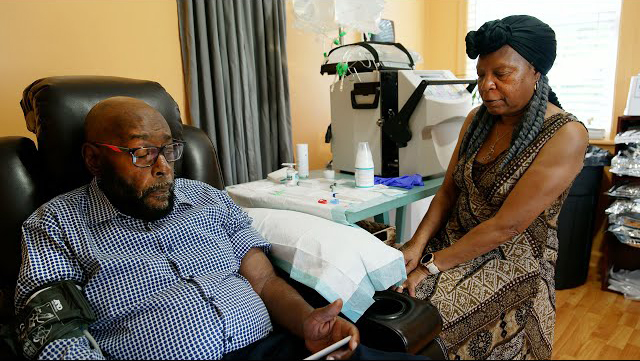Flexibility to Best Meet Patient Needs: Connor's Story
Flexibility to Best Meet Patient Needs: Connor's Story
A Virginia teacher with kidney disease says home treatment allows him to continue work he loves
Published February 7, 2024
For the past 25 years, Connor Samuel has been a fixture at Northumberland High school in rural eastern Virginia where he has worked as the Army Junior ROTC instructor and a teacher to students who are at higher risk of failing out of school.
After Samuel learned in 2015 he would need kidney dialysis treatment to stay alive, he said he was determined to continue teaching.
“To be able to help young folk better themselves so they can be better citizens, that is my main goal,” he said.
Samuel said he was able to continue working and keep up with his teenage students by being given the option to do his dialysis from the comfort of his home and on his own schedule, rather than having to spend hours at a dialysis treatment center during working hours.
He is a patient at DaVita Kidney Care, which treats kidney patients around the country and participates in the Centers for Medicare & Medicaid Services (CMS) Innovation Center pilot, the End-Stage Renal Disease Treatment Choices (ETC) Model. Additionally DaVita participates in the CMS Kidney Care Choices (KCC) Model, which also focuses on kidney patients. Both models aim to improve patients’ overall health care and reduce costs; the ETC Model encourages home dialysis and provides incentives to improve patients’ overall care and quality of life, while Kidney Care Choices aims to improve care and delay the onset of dialysis.
“I can get up the next morning and go to work and feel good all day,” he said of home dialysis, which he does for 2 ½ hours four times a week from a recliner with the help of his wife Jacqueline Samuel.
“I can get up the next morning and go to work and feel good all day,” he said of home dialysis, which he does for 2 ½ hours four times a week from a recliner with the help of his wife Jacqueline Samuel.
More than 800,000 people in the U.S. are living with end-stage renal disease, with 69% receiving dialysis treatment and 31% who have had a kidney transplant, according to the National Institutes of Health. The rate of home dialysis in the U.S. is only about 12%, below that of other developed nations, yet studies have shown that dialyzing at home supports increased independence and quality of life.
“The benefits of the home dialysis are really around patient empowerment,” said Dr. Mihran Naljayan, the Chief Medical Officer for Home Therapies and Pediatrics at DaVita.
Home dialysis “allows patients to make that choice that is right for them,” he said. Other benefits include “the clinical benefits, the longevity of life, [and] the psychosocial benefits such as the ability to work or go to school or take care of loved ones at home. And then, the lower cost of care of home dialysis we see as well,” Naljayan said.
The Samuels learned of home dialysis through Conner Samuel’s nephrologist and decided it was the best option. The couple agrees that it was a joint decision for them, as Jacqueline Samuel is her husband’s care partner and is responsible for administering his treatment, which required training and patience.
Read more about Jacqueline's story.
Connor Samuel said he did not want to slow down, and that continuing to work is vital to his health.
“My work helps me to stay healthy by being active with the young folk. It will keep you active, be able to laugh and smile and grow,” he said. “All of that helps my health to be better.”
Samuel currently serves as the credit recovery teacher, teaching students who have fallen behind in their studies and working to get them back to a passing grade and back to their regular class.
“A lot of times I find the kids aren’t paying attention in class. I get their attention. I’ve never had a kid that failed,” he said. “I enjoy every minute of it.”
Though he said at-home dialysis might not be for everyone, it has given him the flexibility to continue his work and schedule his treatment to optimize his health.
“[Home dialysis] motivates me,” he said. “It gives me energy to get up every morning to come and do a job I think is helping the community. My favorite part of the job is being able to help a student.”
